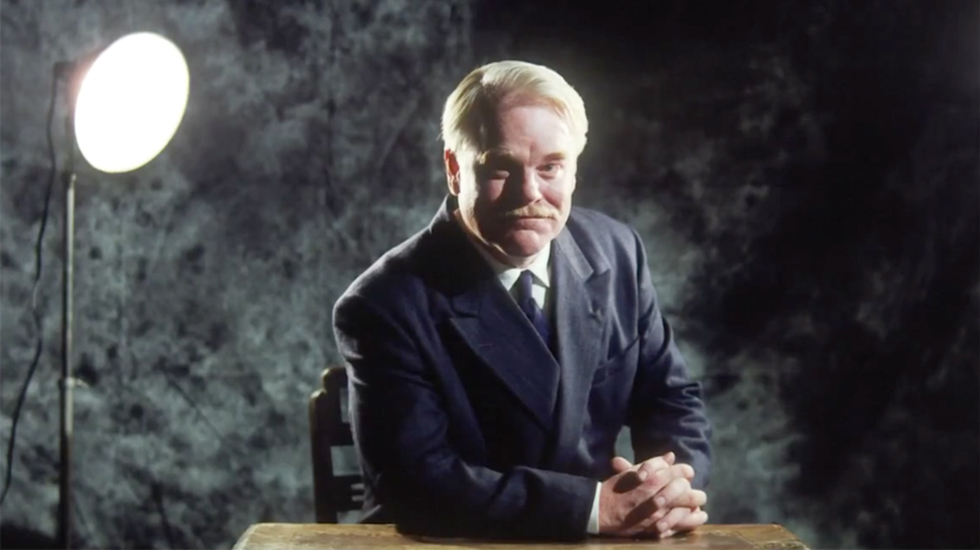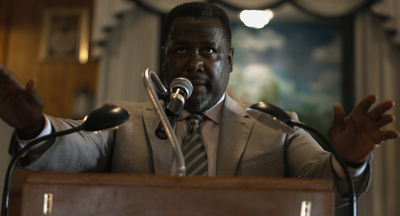
BY KAREN KEMMERLE |
Brilliant Consistency: The Career of Philip Seymour Hoffman
As the world continues to grieve over the death of Philip Seymour Hoffman, we reflect back on his career and find one over-arching theme.

Whenever a great talent passes far too soon, it’s only natural to feel frustrated. At the age of 46, Philip Seymour Hoffman still had decades of great performances left in him, which makes his death all the more maddening. Perhaps that’s why we all feel so cheated. We will never get to see Philip Seymour Hoffman’s adept character work in a new Paul Thomas Anderson movie. He will never return to Broadway again, leaving his stirring portrayal of Willy Loman in the 2013 revival of Death of a Salesman (a performance that actors will speak about in hushed tones for years to come) as his last and perhaps greatest stage appearance. Or maybe we’re all just heartbroken over the loss of one of this generation’s most talented actors.
Hoffman was an actor who lacked any trace of vanity or pride. Gifted with the ability to disappear within his characters, “chameleon-like” doesn’t even begin to describe his approach. Hoffman understood each of his characters down to their core—whether they were despicable or sympathetic (and often, both) and breathed life into them on-screen without reservation, giving them an undeniable authenticity. With vibrant, committed performances, Hoffman seamlessly moved between Hollywood, the indie film world, and the New York stage long after he won his first (and only) Oscar for Capote in 2005. Hoffman was an actor that audiences could depend on, knowing that his involvement in a project would automatically make it worthwhile. His constant excellence ensures his legacy, making it nearly impossible to choose a favorite among his many masterful performances.

Even in his most comedic roles like Along Came Polly, The Big Lebowski or Flawless (all three great, by the way), Hoffman brought a twinge of sadness to the characters he played. Perhaps burdened by his past, Hoffman seemed to be weighted down on and off screen, an everyman quality that endeared him further to us. Because audiences identified with the actor so closely, he was able to make bold choices in his roles; he did not have to be concerned with the likability of his characters.
His big break came in the 1992 film Scent of a Woman starring Al Pacino and Chris O’Donnell. Hoffman played George Willis Jr., a prep-school student pressured by the school’s headmaster to give up the names of the students who had played a vicious prank on him. Weak-willed and easily manipulated, Hoffman’s Willis turns in his fellow students while O’Donnell’s Charlie stands strong. Soon after, he played a recovering addict who befriends Meg Ryan in rehab in the 1994 romantic drama, When A Man Loves A Woman.
In 1996, Hoffman teamed up with Paul Thomas Anderson for the first time in Hard Eight. His brief scene in the film as a Young Craps Player who taunts a veteran gambler is opposite the legendary Philip Baker Hall. Motor-mouthed and fidgety, Hoffman is remarkably convincing as an aggressive rube, clearly out of his depth running a table in a Casino. Hall’s Sydney suffers no fools and makes Hoffman’s character pay for his insolence by betting an obscene amount of money. In the span of two minutes, Hoffman goes from obnoxious to arrogant to vulnerable and back again. It wasn’t hard to discern that there were two masters (if you don’t count P.T.A behind the camera) at work in that scene.

After an enjoyable supporting role as one of the storm chasers in Twister (the extreme!!), Hoffman reteamed with Paul Thomas Anderson for Boogie Nights. As gay boom operator Scotty J., Hoffman displays a striking fragility as he attempts to kiss the object of his affection, Dirk Diggler (Mark Wahlberg) unsuccessfully, amid the events of one chaotic party. Shot all in one take, Scotty breaks down in his car and gives off flashes of anger, embarrassment and anguish as he repeats the phrase “I’m a fucking idiot” over and over. It’s a heartbreaking moment in a powerful film.
1998 brought Hoffman the opportunity to work with the Coen Brothers and famed cult director Todd Solondz. In The Big Lebowski, Hoffman made a memorable impression as Brandt, the sycophantic assistant of and mediator for the mysterious “Big” Lebowski. As Allen, the lovelorn obscene phone caller in Happiness, Hoffman plays a wreck of a man, full of self-loathing and ashamed of compulsions that he cannot control. In this incredibly raw performance, Hoffman unselfconsciously spews lines of filthy dialogue into the phone and perseverates over his misdeeds.
At the age of 46, Philip Seymour Hoffman still had decades of great performances left in him. Perhaps that’s why we all feel so cheated.
After a revelatory performance as Rusty, a drag “artist,” opposite our own Robert De Niro in Flawless, Hoffman appeared as nurse Phil Pharma in Paul Thomas Anderson’s Magnolia and in Anthony Minghella’s The Talented Mr. Ripley as the flamboyant yet doomed Freddie Miles who, venomous and cruel, tries to stop an interloper from entering his group of privileged friends, only to be snuffed out for his troubles. In 2000, Hoffman played rock journalist Lester Bangs, a haphazard mentor for William (Patrick Fugit) in Cameron Crowe’s Almost Famous. Long-haired, cynical and nostalgic for an era of music gone by, Hoffman perfectly captures the journalist’s world-weariness as he attempts to help William keep his integrity in the “industry of cool.”
After notable turns in Spike Lee’s 25th Hour, Brett Ratner’s Red Dragon, Paul Thomas Anderson’s Punch-Drunk Love and as the gasoline-huffing sad-sack lead in Love Liza, Hoffman received his first (and only) Oscar for Capote. As Truman Capote, Hoffman is nothing less than miraculous, perfecting Capote’s trademark voice and adopting his ostentatious mannerisms without parody. Consumed by the Clutter family murders, Hoffman’s Capote is arrogant, obsessive and pushy, but sympathetic in that he carries with him deep wounds from his childhood and from the prejudice he continues to face. Hoffman’s transformation is stunning and utterly unforgettable.

In a daring move, Hoffman followed up his Oscar triumph by playing the villainous Owen Davian in Mission: Impossible III. An impressive baddie, Hoffman’s Davian oozes calm intelligence, successfully blending an air of sophistication and menace as he calmly threatens to destroy everything Ethan Hunt holds dear to get what he wants. After starring in Tamara Jenkins’ sibling drama The Savages and Sidney Lumet’s Before the Devil Knows You’re Dead, Hoffman earned his second Oscar nomination for his work as the eccentric CIA agent Gust Avrakotos in Mike Nichols’ Charlie Wilson’s War.
Though he was passed over by the Academy for his tremendous performance as an egotistical theater director in Charlie Kaufman’s Synecdoche, New York, Hoffman received his third nomination in 2008. In Doubt, Hoffman plays Father Brendan Flynn, a progressive priest who is accused of molesting an altar boy out of spite by Sister Aloysius (Meryl Streep). As a man fighting for life, Hoffman is mesmerizing as he treads the thin line between guilt and innocent, bravely letting the audience decide what happened.

In 2010, Philip Seymour Hoffman directed and starred in Jack Goes Boating (which he brought from the Labyrinth Theater Company to the big screen). In 2011, he appeared in both Moneyball and The Ides of March in supporting roles, elevating these already sterling ensemble productions with subtle, affecting performances. Hoffman’s last Oscar nomination came in 2012 for his role as the fanatical religious leader Lancaster Dodd in Paul Thomas Anderson’s The Master. As Dodd, Hoffman is enigmatic, nurturing and dangerous all at the same time. He instills a humanity in this complicated character, who retains his natural bravado and authority even though he is on the brink of losing everything.
Though we have lost one of cinema’s most gifted character actors, we can take comfort in the fact that Hoffman had completed work on John Slattery’s God’s Pocket and Anton Corbijn’s A Most Wanted Man, both of which premiered at the 2014 Sundance Film Festival. He had almost completed shooting his role as Plutarch Heavensbee in The Hunger Games: Mockingjay Part I and II, and Lionsgate has announced that his tragic death will not affect the film’s scheduled release date.
Through his diverse body of work—both on-screen and on-stage—Philip Seymour Hoffman will continue to inspire future generations of actors and artists, but we can’t help but think of all the performances he will not give and all of the projects that he will not enrich.

